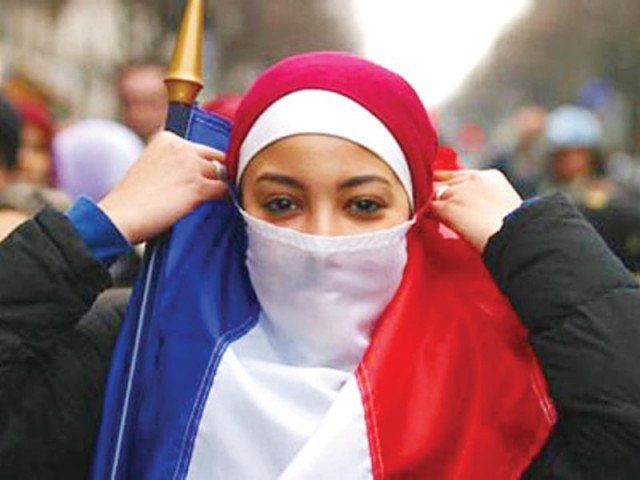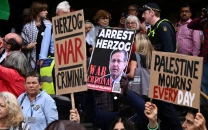Veiled agendas
Starting 11 April, it will be illegal in France for any woman to wear a full-faced veil.

Veiled agendas
The fine for wearing a face covering veil publicly is EU €150 (US $208) and the woman will be given a citizenship class to remind her of the republican values of secular France. Face veils will be outlawed virtually anywhere outside women’s own homes, except when they are worshipping in a religious place or travelling as a passenger in a private car, although traffic police may stop them if they think they do not have a clear “field of vision” while driving. After a teacher was convicted for trying to rip a face veil from an Emirati tourist in a shop, the law also states that public officials cannot force women to remove their niqabs in the street, but must instead call the police.
Immigration historian Patrick Weil warns that the law is open to challenge from the European court of human rights. He said the battle to stop women wearing ‘niqab’ did not justify that “a woman who believes that her God orders her to wear it should be stopped from going out to buy food to feed herself, or from going to see a doctor.”
Although the French law has gotten the most attention, Belgium was actually the first country to enact a ban last April while there is the move towards a similar law in Italy. In 2004, France banned headscarves and all conspicuous religious symbols from state schools. But since the niqab ban was voted in by parliament, standard headscarves have also become a bone of contention. A worker in a private creche went to court and lost after she claimed she was fired for refusing to take off her headscarf. The education minister insisted that mothers in headscarves should not be allowed to accompany children on school outings. One mother banned from escorting her son’s primary school class for wearing a simple head-covering said: “I’m French, not a fanatic, I just want to be able to practise my religion without being ostracised.”
When asked why he supported the proposed law banning “overt religious symbols”, French citizen Jean-Michel Andrejevski replied, “It’s a means to defend France and Europe against the spread of Islam.”
Ironically, in order not to stigmatise Muslims, the law bans any face-covering. Officially called the bill against “covering one’s face in public places,” it bans balaclavas, hoodies or masks as well as the Muslim veil. It is presented as issue of public order and gender equality, not secularism, but is widely viewed as related to the country’s 2012 presidential elections.
Only a tiny minority of women in France wear full niqab, far fewer than in the UK, only a few hundred out of France’s 6 million Muslims.
The real reason behind the ban is said to be concern about the growing gains of the far-right National Front in France. Desperate to secure the far-right electorate in the election, Sarkozy is being critiqued for deliberately singling out France’s Muslim population to win votes. Today, having frittered away his image as a dynamic leader, President Nicholas Sarkozy is the most unpopular president in the Fifth republic while the National Front’s Marine Le Pen is virtually at the palace gates. Le Pen has seen the Front’s popularity soar since she compared Muslims praying in the streets outside overcrowded mosques to the Nazi occupation of France. She couches all this in terms of defending “republican values”, secularism and feminism in the face of religious extremism. She is setting the agenda on Islam.
The timing of the new law risks plunging France into an identity crisis. The niqab ban has reopened the long-running debate over how the country with Europe’s biggest Muslim community integrates Islam into its secular republic. The prime minister, François Fillon, has argued that face coverings put those who wear them “in a situation of exclusion and inferiority incompatible with the principles of liberty, equality and human dignity affirmed by the French republic.”
While Marine Le Pen has criticised halal-only fast food restaurants, Sarkozy has ordered a nationwide debate in April on Islam’s place in secular France, outlining objections to halal food options in school canteens, no prayers out of doors and no minarets. The debate is expected to address Islam-specific issues such as the financing of mosques and the ideological backgrounds of imams leading services. The initiative was originally framed as a national conversation on “how to organise religious practice so that it is compatible in our country with the rules of our secular republics”. But following a TV appearance in which Sarkozy questioned what kind of “limits” needed to be placed on Islam in France, the debate has been increasingly viewed as specifically targeting French Muslims. PM Fillon has distanced himself from Sarkozy’s debate on Islam and said he was opposed to the “stigmatisation of Muslims”.
One week before the parliamentary session on secularism and the role of Islam, French religious leaders representing the six major faiths co-signed an editorial denouncing the debate as a potential source of discrimination. Catholic, Protestant, Jewish, Orthodox, Muslim, and Buddhist leaders warned against “squandering the precious practice” of laïcité, France’s particularly unflinching brand of secularism enshrined in a 1905 law officially separating the Catholic Church and the state.
Considering the fact that the debate about secularism in France has largely centred around Islam, the editorial also suggests a solidarity with the Muslim community.
Le Pen, a member of the European parliament, believes that France’s cultural identity is under attack from “a type of Soviet-style planning where we are seeking through massive immigration to weaken identities through a sort of general multiculturalism where everyone suffers.”
Given recent developments in the Middle East, there is the likelihood of an increased influx of immigrants heading towards France. Harnessing post-credit-crunch insecurity, Le Pen plays to the gallery with aplomb. “It is time that we question the politician’s rhetoric that if you question immigration it means you are a racist. For 20 years in France, anyone who was against immigration was called a racist. But now since immigration is perhaps the biggest problem of the 21st century, I think we should be able to talk about immigration without being accused of xenophobia. There is a certain threshold above which the identities are shaken and collapse and we’re setting up the conditions for a clash of cultures.”
The Jewish umbrella association, Crif, and Licra, the International League against Racism and Anti-semitism, has warned that Le Pen’s discourse was “a threat to Jews and Muslims” and the far-right was making scapegoats of Muslims in the same way Jews were targeted during the anti-Semitism of France in the 1930s.
Le Pen protests.”But there’s no islamophobia. People are just trying to recreate the conditions of a latent conflict aimed at making French people feel guilty. If you’re in favour of respecting the law, you’re an islamophobe! I’m not fighting against a religion. I’m like Richelieu, I’m fighting against the constitution of a state within the state. I think that French laws, values and principles should apply to everyone. And those who don’t respect those laws and principles should be firmly made to respect them.”
Le Pen has ditched her father’s overtones of anti-Semitic extremism, while defending the core of his nationalism, and courting a new white-collar electorate fearful of crime, immigration, Muslims and losing their jobs. This has garnered a historic 15% for the National Front in the first round of local elections and she has brought a fresh anti-capitalist tone to the Front’s rhetoric. The far left indicts capitalism; the far right points the finger of blame at immigrants. The far left would recommend revolution; the far right, ethnic cleansing. As Le Pen puts it, “The right-left divide makes no sense any more. Now the reality divide is between nationalism and globalisation.”
In the ascent of Le Pen, there are lessons for the future of democratic politics in Europe and the West. Marine Le Pen is an effective spokeswoman for a new strain of moderate intolerance — white collar rather than blue collar; educated, not just ignorant; Ukip not just BNP — which is already powerful in the Netherlands, Belgium, Italy and Austria. Between one-quarter and one-third of Continental Europeans feel disenfranchised, and are prepared to vote for any “protest” party, whether far right or far left. The reason is essentially the same throughout Europe: slow economic growth and dwindling prospects for a better life, while the welfare state has failed to create jobs. Le Pen cleverly exploits the hunger for “identity” and simple “values” in a threateningly “global” world. Anti-capitalist revolution was tried in half of Europe in the last century, with dire results. Expulsion of immigrants has not. Saddled with a slow economy, a failed welfare state, and uncontrolled immigration — challenges for which no mainstream parties on the right or the left have any coherent proposals — the appeal of the far right’s soft populism will continue to haunt France and Europe.
Published in The Express Tribune, Sunday Magazine, April 10th, 2011.



















COMMENTS
Comments are moderated and generally will be posted if they are on-topic and not abusive.
For more information, please see our Comments FAQ